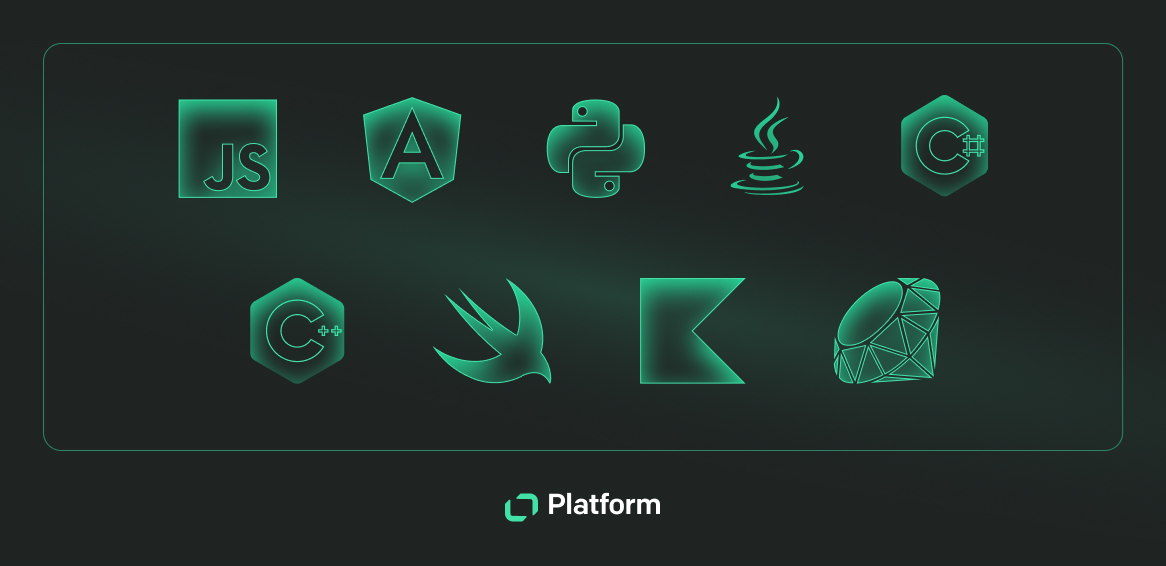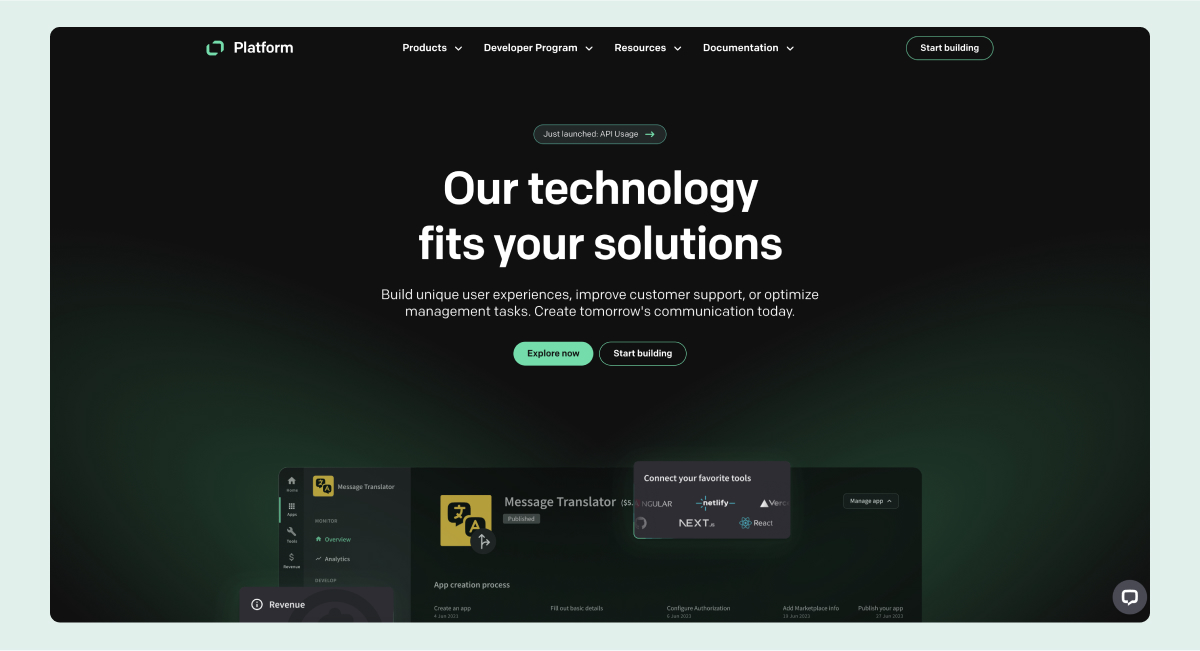Software and application development has become a prominent opportunity for those searching for dynamic and successful technological careers. Multiple businesses and industries leverage software and applications to run their operations on complex systems.
The prospect of become a software developer holds immense appeal, providing the opportunity to build, innovate, and solve problems in a rapidly changing digital environment.
However, becoming a software engineer can be challenging, and there are many uncertainties and questions. Where does one begin? What skills are important for aspiring software engineers? How long does it take to become a software engineer?
This article will explain how to become a software developer and provide meaningful insights and guidance for beginners to enter this dynamic field. If you've recently graduated or are curious to learn to code, we’ll help you choose the right track toward achieving your goals in software development.
Let’s get started, shall we?
Software developers vs. software engineers
When you hear the terms software engineer and software developer, you might think they are entirely different roles. However, the truth is that they have a lot in common. Both positions are essential in the technology industry, creating and developing software products we use daily.
A software developer focuses on creating and implementing software applications. They focus on writing, testing, and debugging code. Still, at their core, both roles require a deep understanding of programming languages and critical thinking skills. So, while they may differ in scope and responsibilities, the distinctions between a software engineer and a software developer remain relatively small.
A software engineer takes a more holistic approach, considering everything from the design and development phase to the testing and implementation. Software engineers typically work on the larger engineering process, including designing software architecture and identifying potential risks and solutions.
What are the roles of a software developer?
Software developers play an important role in transforming the digital environment. They have the professional skills to build robust software applications and operating systems, such as social media platforms, ecommerce websites, etc. Primarily, the software developer's role involves designing, building, and maintaining computer software systems.
Here are the primary tasks of a software developer:
Understanding software user requirements
A key responsibility of software developers is understanding and translating user requirements into functional software solutions. This includes working closely with stakeholders, like project managers, designers, and end users, to accumulate feedback and refine the product's functionalities. By understanding the software requirements and preferences of software users, aspiring software engineers can build robust applications that improve the overall client experience.
Maintaining and updating existing systems
Software developers maintain and update existing computer software to make it secure, effective, and compatible with modern technologies. They identify and fix bugs and errors, enhance execution, and carry out new highlights or functionalities on a case-by-case basis.
For example, software engineers help organizations remain competitive by continuously observing and improving their software products.
Driving innovation and advancement
Software developers are responsible for driving innovation and technological advancement. They explore new technologies to build software solutions using frameworks, coding languages, and development techniques.
They can also drive innovation across various industries by developing algorithms for artificial intelligence, creating virtual reality experiences, or utilizing blockchain technology.
Collaborate with interdisciplinary teams
Another important factor of a software developer’s role is collaboration with other interdisciplinary team members. To create software, they work with UX designers (during software design), project managers, and quality assurance engineers (during software testing).
Popular programming languages and technologies for software developers
Software developers can learn various programming languages and technologies based on the requirements and preferences of a project they plan to work on. Here are the most popular languages and technologies:
- JavaScript is used to create interactive interfaces in web development. Different frameworks like Angular can be used for frontend development.
- Python is mostly used in fields like data science, machine learning, and artificial intelligence. Other prominent frameworks like Django and Flask are used for web development and libraries.
- Java is a robust object-oriented programming language. It’s mostly used to build web and mobile applications. The Java ecosystem can use the most popular frameworks like Spring and Hibernate.
- C# is broadly used for developing Windows desktop and web applications using the ASP.NET framework.
- C++ is used to build games, applications, and system programs. It also offers low-level control over hardware resources. Most game development engines, like Unreal, use C++ for gaming.
- Swift is used to create iOS and macOS applications. It offers speed and modern syntax, making writing the code for Apple platforms easy.
- Kotlin is used to build Android applications and offers robust features like concise syntax structure. It has become prominent in Android development due to its safety features.
- Ruby is used to build web applications, specifically with the Ruby on Rails framework.

Valuable tips about how to become a software developer
Learning how to become a software developer can be daunting. But here are 12 helpful tips whether you're a beginner or intend to move into the industry.
Tip 1: Learn the fundamentals
Learning algorithms and data structures is necessary to comprehend software development fundamentals. You can learn computer science from various online books, resources, and courses to help you succeed in the industry.
Tip 2: Choose the right programming language
Although there are numerous programming languages, it's essential to concentrate on just one or two at first. Famous languages like Python, Java, JavaScript, and C# are generally utilized in the business and offer various opportunities for software development.
While picking a programming language to learn, it will be helpful to consider factors like the language's popularity, significance to your career objectives, and job market demand in your space.
Tip 3: Practice, practice, practice
Like any expertise, becoming a software engineer requires a lot of practice and devotion. You must set a regular time to learn code, tackle coding difficulties, and work on interesting projects.
We recommend improving your programming skills by practicing your coding in different projects on websites like Codecademy.
Tip 4: Build a strong portfolio
Creating a project portfolio to demonstrate your expertise and experience to potential employers is essential. Start by working on personal projects that allow you to put what you've learned into practice and align with your interests.
Whether you want to create a mobile application, develop a website, or build a software tool, you must focus on projects that exhibit your critical thinking skills and showcase your engineering strengths. Remember to display your projects on platforms like GitHub and include them in your resume and online portfolio.
If you're looking for more tips for building your professional website, check out our comprehensive portfolio guide.
Tip 5: Seek mentorship and guidance
It’s important to seek guidance from experts in the field. Based on their own experiences, mentors can offer valuable insights and feedback.
To achieve this, you can join online communities and forums and connect with peers and mentors or contact developers in your network. A mentor can guide career decisions and assist you with exploring challenges along the way.
Tip 6: Develop strong problem-solving skills
Software development lifecycle revolves around finding solutions to problems. As a developer, you'll experience challenges and bugs requiring creative solutions.
Adopt the approach to troubleshooting problems by practicing breaking down complex problems into smaller ones. Indeed, better problem-solving skills make you a better developer and boost your confidence when dealing with new and unfamiliar issues.
Tip 7: Embrace Agile methodologies
Understanding Agile methodologies such as Scrum and Kanban is important. Both of these are broadly utilized in software development teams.
You should also understand the Agile principles and practices. Knowing their characteristics will prepare you for working in a cooperative environment and improve your ability to participate in software projects.
Tip 8: Effective communication skills
Effective communication plays a vital role in software engineering. In simple terms, it helps web developers understand a project problem they’re about to solve with code.
Learning how to document your code, project specifications, and decisions is also great for facilitating team members' comprehension and collaboration.
Tip 9: Stay resilient and persistent
Learning to become a software developer takes time and effort. You'll experience misfortunes, dissatisfactions, and moments of uncertainty. Staying resilient and maintaining a positive mentality during challenging times is vital.
Remember that mistakes are opportunities for growth and continuous learning. Make sure to also celebrate your victories and remain focused on your objectives.
Tip 10: Build a professional network
Networking is a significant part of career development. You should pay attention to connecting with experts through LinkedIn, proficient associations, gatherings, and local meetups.
Building a strong network for an organization gives valuable opportunities for mentorship, cooperation, and professional success. It helps you to remain informed about industry trends and software engineering job opportunities. Focus on sustaining and extending your network to leverage its benefits in your software development career.
Tip 11: Prioritize code quality and best practices
As a software engineer, writing perfect, viable code is fundamental for building advanced and versatile applications. Pay attention to software engineering principles, plan examples, and keep your code in line with coding standards specific to the programming languages and frameworks you use.
Focus on your code's readability, efficiency, and scalability. Follow the naming convention rules, write descriptive comments to guarantee your code is easy to understand. This will facilitate collaboration with other developers and contribute to the long-term success of your projects.
Tip 12: Stay informed and adapt to industry trends
Software development is always changing. New technologies, tools, and methods are coming out quickly. Follow tech websites to keep yourself informed about industry patterns and advancements.
To stay up to date with the market demand and learn about skills and technologies, follow software engineering job boards. And to remain competitive in the job market, you must continue learning skills to handle the upcoming advanced challenges.
How long does it take to become a software developer?
You may be concerned about how long it takes to become a software developer since it depends on several factors, including your prior hands-on experience, formal education background, and learning pace.
A general overview of the typical timelines for the educational career path to become a software engineer is as follows:
Bachelor's degree
If you intend to pursue a software engineering career, you need a bachelor's degree in software engineering or a related field. The bachelor's degree lasts four years, and you will gain various programming and software development skills.
Once you complete your college degree, you’ll have advanced knowledge and soft skills to pursue entry-level engineering positions.
Bootcamp
Coding bootcamps offer vivid projects to teach coding skills and prepare students for entry-level roles in the tech business. Bootcamps can be full-time programs lasting 12 to about four months or part-time projects lasting several months.
Fortunately, most bootcamps offer web development, mobile app development, computer science education, and software engineering courses. Bootcamp graduates can quickly advance into software engineering positions using their newly acquired analytical skills and project portfolios.
Self-learning and online courses
Some people gain their programming and software development skills through self-learning and online courses. While this approach offers adaptability and independence, the timeline for self-learning can differ based on your devotion, discipline, and access to resources.
Multiple online platforms offer courses in programming languages, web advancement, and software standards, allowing you to customize your learning process according to your preferences and objectives.
With self-learning, you can become a successful software engineer in several months or a few years based on your continuous learning skills and daily practice.
Career advancement and specialization
Software engineers can specialize in different fields to take advantage of various career opportunities. Career advancement and specialization typically require undergraduate education, training, or professional experience, extending the time to become a software engineer.
This could mean moving into leadership roles like technical lead, engineering manager, or software architect or focusing on specialized domains like machine learning, cybersecurity, or mobile app development. However, the duration can vary based on software engineer career objectives, advanced opportunities, and obligation to proficient growth.
How can Text Platform help?
The Text Platform can help software developers in several ways.
Learning resources: The Text Platform gives you access to a huge repository of learning resources, including tutorials, documentation, articles, and guides on different programming languages, technologies, and frameworks. Engineers can use these resources to upgrade their skills, learn new ideas, and remain updated with the emerging trends in software development.
Code sharing and collaboration: The Text Platform allows developers to share code, advanced solutions, and best practices with friends and associates within the developer community. By encouraging collaboration and knowledge sharing, individuals can benefit from each other's expertise and experiences.
Tech support: Developers frequently encounter technical difficulties or problems when working on projects. The Text Platform offers developers a chance to seek help, clarify pressing issues, and seek guidance from experienced engineers or community members.
Networking opportunities: The Text Platform offers networking and associations among developers that help individuals to connect with similar experts, join communities and forums, and participate in conversations on subjects of interest. Such networking can lead to significant software engineer career opportunities, mentorship connections, and project collaboration.
Project management and communication: The Text Platform provides tools and features for project management and communication, making it possible for developers to collaborate effectively with members of their teams, monitor tasks and progress, and instantly communicate project updates. This helps streamline the work process, develop efficiency, and guarantee that projects are finished on time and within budget.

Final words
In short, learning how to become a software developer depends on continuous practice, resilience, and a passion for innovation. As you’ve learned, your success is measured not only by your technical skills but also by your ability to adapt to changes and communicate effectively.
You need to embrace difficulties with a development mentality, seeing misfortunes as opportunities for development and learning. Focus on critical thinking abilities, leveling up your skill to handle complex, specialized difficulties with imagination and steadiness. Build a solid portfolio of projects highlighting your abilities and demonstrating your capacity to provide effective solutions.
Improving your communication skills is also important. Remember to look for opportunities to network, get a mentor, learn from experienced professionals, and build relationships that will help you advance in your career.
Most importantly, you must remember that becoming a software engineer is an ongoing journey. You should stay curious, humble, and focused on long-lasting learning. Always accept the challenges and opportunities that come your way, knowing that each will improve your development skills as a software engineer and developer.


